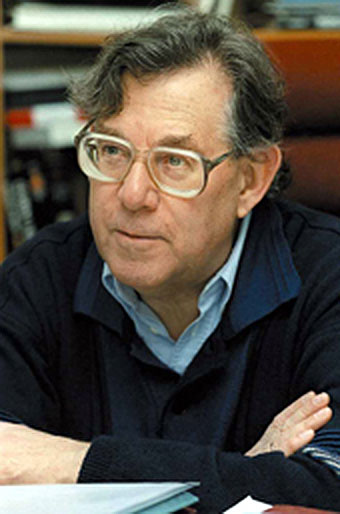- Paul J. Crutzen
Infobox Scientist
name = Paul Jozef Crutzen
box_width =
image_width =
caption =
birth_date = birth date and age|1933|12|3
birth_place =Amsterdam ,Netherlands
death_date =
death_place =
residence =
citizenship =
nationality =
ethnicity =
field =Chemistry ,Physics
work_institutions =
alma_mater =
doctoral_advisor =
doctoral_students =
known_for =
author_abbrev_bot =
author_abbrev_zoo =
influences =
influenced =
prizes =Nobel Prize in Chemistry (1995)
religion =
footnotes =Paul Jozef Crutzen (born
December 3 ,1933 ,Amsterdam ) is a DutchNobel prize winning atmospheric chemist.Crutzen is best known for his research on
ozone depletion . He lists his main research interests as "Stratospheric and tropospheric chemistry, and their role in the biogeochemical cycles and climate". [cite web|url=http://www.mpch-mainz.mpg.de/%7Eair/crutzen/interest.html|title=www.mpch-mainz.mpg.de/%7Eair/crutzen/interest.html ] He currently works at the Department of Atmospheric Chemistry at theMax Planck Institute for Chemistry , [cite web|url=http://www.atmosphere.mpg.de/enid/2.html|title=www.atmosphere.mpg.de/enid/2.html ] inMainz ,Germany and theScripps Institution of Oceanography at theUniversity of California . He was also a long-timeadjunct professor at Georgia Tech andResearch Professor at the department of Meteorology of theStockholm University , Sweden. [cite news|first=Greg|last=Keisel|url=http://technique.library.gatech.edu/issues/fall1995/nov17/campus3-s.html|title=Nobel Prize winner at Tech|work=The Technique |date=1995-11-17|accessdate=2007-05-22]Awards
This is a partial list. See [http://www.mpch-mainz.mpg.de/~air/crutzen/vita.html] for more.
* 1976: Outstanding Publication Award, Environmental Research Laboratories,National Oceanic and Atmospheric Administration (NOAA), Boulder, Colorado, U.S.A.
* 1984: Rolex-Discover Scientist of the Year.
* 1985: Recipient of theLeo Szilard Award for "Physics in the Publics Interest" of the American Physical Society.
* 1986: Elected to Fellow of theAmerican Geophysical Union
* 1989:Tyler Prize for Environmental Achievement .
* 1991: Member of theRoyal Swedish Academy of Sciences ;
* 1995:Nobel Prize in Chemistry (with Dr. M. Molina and Dr. F. S. Rowland, U.S.A.)
* 1995: Recipient of the Global Ozone Award for "Outstanding Contribution for the Protection of the Ozone Layer" byUnited Nations Environment Programme .
* 1996: Honorary Member of theInternational Ozone Commission
* 1999: Foreign Member of theRussian Academy of Sciences
* 2002: Worldwide most cited author in the Geosciences with 2911 citations from 110 publications during the decade 1991-2001,Institute for Scientific Information Anthropocene
In 2000, in
IGBP Newsletter 41, Crutzen andEugene F. Stoermer , to emphasize the central role of mankind in geology and ecology, proposed using the termanthropocene for the current geological epoch. In regard to its start, they said:: "To assign a more specific date to the onset of the 'anthropocene" seems somewhat arbitrary, but we propose the latter part of the 18th century, although we are aware that alternative proposals can be made (some may even want to include the entire
holocene ). However, we choose this date because, during the past two centuries, the global effects of human activities have become clearly noticeable. This is the period when data retrieved from glacial ice cores show the beginning of a growth in the atmospheric concentrations of several 'greenhouse gases", in particular CO2 and CH4. Such a starting date also coincides withJames Watt 's invention of thesteam engine in 1784." [cite web|url=http://www.mpch-mainz.mpg.de/~air/anthropocene/|title=www.mpch-mainz.mpg.de/~air/anthropocene/ ]Global Warming
Steve Connor, Science Editor of the "Independent", wrote:
*Professor Paul Crutzen, who won a Nobel Prize in 1995 for his work on the hole in the ozone layer, believes that political attempts to limit man-made greenhouse gases are so pitiful that a radical contingency plan is needed.
*In a polemical scientific essay that was published in the August 2006 issue of the journal Climatic Change, he says that an "escape route" is needed if global warming begins to run out of control. [cite web|url=http://www.springerlink.com/content/t1vn75m458373h63/fulltext.pdf|title=www.springerlink.com/content/t1vn75m458373h63/fulltext.pdf |format=PDF]
*Professor Crutzen has proposed a method of artificially cooling the global climate by releasing particles ofsulphur in the upper atmosphere, which would reflect sunlight and heat back into space. The controversial proposal is being taken seriously by scientists because Professor Crutzen has a proven track record in atmospheric research. [cite web|url=http://news.independent.co.uk/environment/article1205975.ece|title=news.independent.co.uk/environment/article1205975.ece ]
*In January 2008, Crutzen published findings that the release ofNitrous Oxide (N2O) emissions in the production ofbiofuels mean that they contribute more to global warming than fossil fuels. [cite web|url=http://www.atmos-chem-phys.net/8/389|title=N2O release from agro-biofuel production negates global warming reduction by replacing fossil fuels]Nuclear Winter
Crutzen was also a leader in promoting the theory of
Nuclear winter .See also
*
Nuclear winter
*Global dimming
*Global warming
*Albedo
*1991 eruption of Mount Pinatubo
*Planetary engineering References
External links
* [http://www.mpch-mainz.mpg.de/~air/crutzen/ His home page]
* [http://nobelprize.org/chemistry/laureates/1995/crutzen-autobio.html Autobiography from nobelprize.org]
* [http://nobelprize.org/nobel_prizes/chemistry/laureates/1995/crutzen-cv.html CV from nobelprize.org]
* [http://hcr3.isiknowledge.com/author.cgi?&link1=Search&link2=Search%20Results&AuthLastName=crutzen&AuthFirstName=&AuthMiddleName=&AuthMailnstName=&CountryID=-1&DisciplineID=0&id=1113 Entry on the ISI "highly cited" database]
* [http://www.vega.org.uk/video/programme/111 An Interview - Paul Crutzen talks to Harry Kroto] Freeview video by the Vega Science Trust.
Wikimedia Foundation. 2010.
